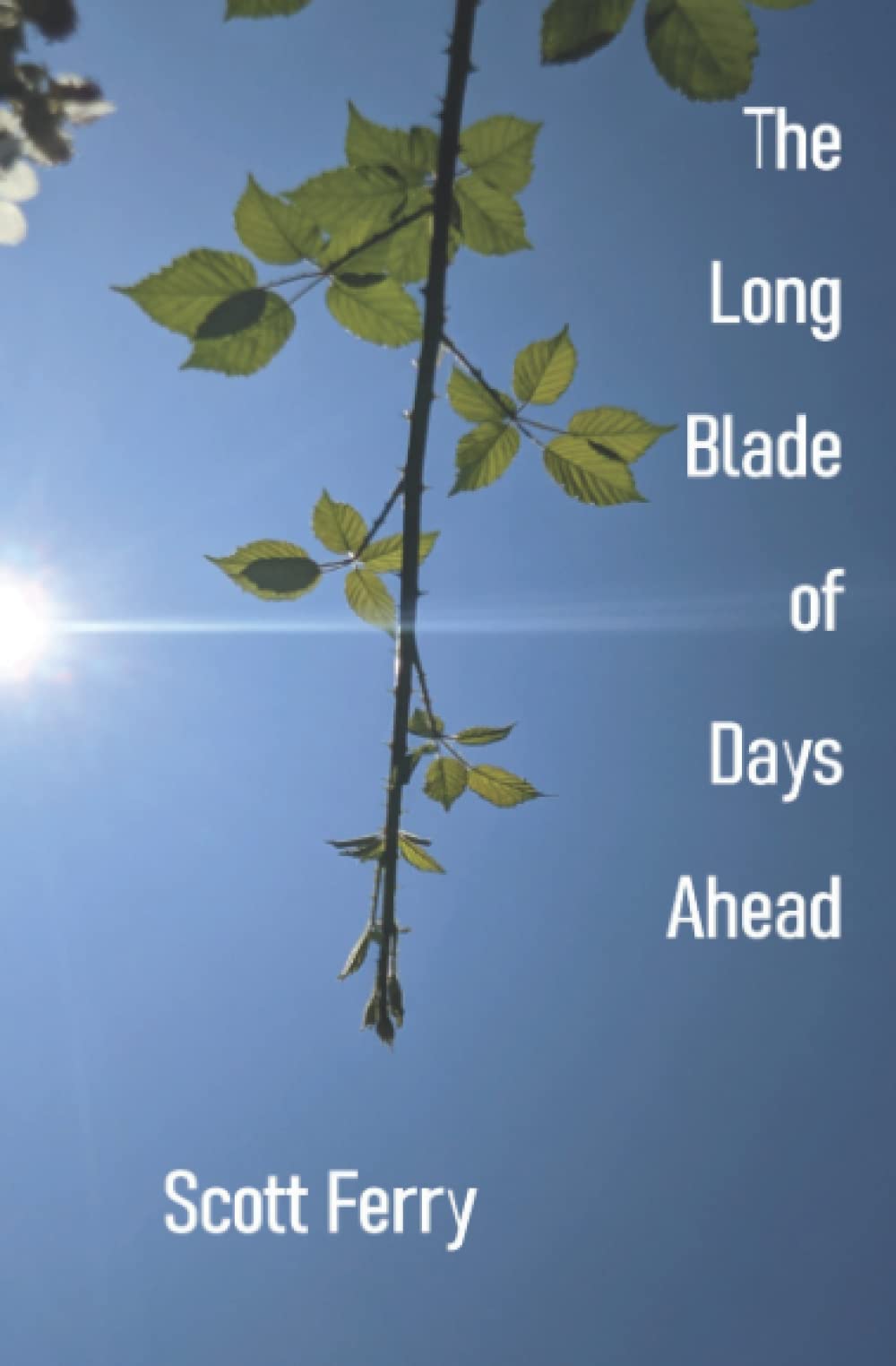The Long Blade of Days Ahead by Scott Ferry is a compelling collection of poetry that propels readers into a world of hauntings, parenting, and God as both a savior and a sinister phenomenon, along with the lingering reality of death among generations.
What makes Ferry’s poetry intriguing is this hyper-awareness of death and ghosts of relatives who have passed on. Readers are immersed in a world that reveals an existential crisis amidst suburban duties such as holidays, gardening, and a father changing diapers. Consider this line:
there was no solid in the diaper
for now just another ghost
in the body escaping
meaning
Ferry’s work further explores parenthood and the loss of innocence. One of the most heart-wrenching poems is “Santa.” The poet’s daughter is “unmasked suddenly older” and Ferry reflects by stating: “i say once you know you / can never go back.” This powerful line implies that wonder can be contained for only a short amount of time, even in the most magical time of year.
Throughout the collection ghosts appear in numerous poems from “longing is the only pain in heaven” (where the poet realizes that he might be the ghost) to “4/12.” In the section titled “god is only a weapon,” Ferry states that a “ghost is a skinless person.”
In this same section we are, once again, reminded of the loss of innocence and God as an unpredictable being. When the poet’s daughter is learning about atoms, she asks her father: “would god do that? / make me into a bomb?” Ferry doesn’t have an answer, but he finally responds:
…man chose to kill thousands
with this knowledge
and she looks sad but not surprised
and that makes me infinitely
more sad that she knows
already at ten
what men are capable of
she knows that for man
god is only a weapon
The last line is another illustration of growing up and losing faith in a being that is supposed to be benevolent in his interactions with mankind. This poem also criticizes humanity along with a religion that often fails to make sense of the brutalities of history and war. In utilizing the critical analysis of reader response theory, I was reminded of the uncertainty of religion as a spectator’s sport: reminiscent of King Lear, after Gloucester is blinded by Cornwall and Regan, he states “as flies to wanton boys are we to th’gods. They kill us for their sport” (King Lear, Act IV, scene 1).
As the poet wrestles with these questions, he is also able to see the light, the salvation of the savior in poems like “Save:” “see the savior through the lights and/lights.” The notion of a father’s love, or God’s love, is also apparent in “jet lag has made my son:”
so often i hear him say daddy
as if to check if i am still alive
and i feel wet kisses on my
cheek near my mouth
and i think this is how god
performs cpr this is how
a small love expands like
a breath into every dark place.
Earth is also a realm under heaven as a force for humans to be grounded. In “photograph,” we are reminded of the various dimensions of life:
this will not be how
we remember it
the trees we planted
will reach into the clouds
long before we float up
we will be left rereading
old prayers for deliverance
when all we want is to stay
here rooted in this glorious
pain.
This somber gaze at trees growing past our death is a theme that appears throughout the collection. The unraveling of the pain of reality between life and death, heaven and earth, light and dark is what makes Ferry’s voice palpable for parents and anyone who has grappled with grief and doubted their chosen deities. In “photograph” the poet also examines the connection to the earthly realm—this in itself is a saving grace, the ability to stay grounded “here rooted in this glorious pain.” This connection to earth, and notion of dying while watching your children grow from above is a compelling theme, as in “4/10”:
…and one day i will fall
into it and not get up and my son will lift
my skull to the heavens and
lick it clean.
The notion of God and his connection to humans and earth is a running theme in The Long Blade of Days Ahead. There is an acknowledgement of light, God and good; however often it is seen as a necessary evil, as if God is witnessing the events on earth with a callous eye. God sees death, yet as humans are rooted in pain, life still goes on, as shown in “5/1”:
getting mad at a child
who can’t sleep
is like being angry at god
for not keeping a sick
person alive
regardless of our
cradling hands
they will go when they go
silver-gilled to the
river.
One of the interesting themes of Ferry’s work is observing everyday existence from the perspective of a human who has suffered loss and is now noticing how life is affecting his family on a daily basis as well as nature as the fundamental root of being grounded. In the final poem, Ferry finds solace in observing the simple dance of bees; even through all of the pain and darkness, we may hold such small mysteries sacred:
…to watch the bees
…it is a kind of godtrance…
…i’m grateful that my son
stands here with me and in this way
is witness
to how we may
pray
***

